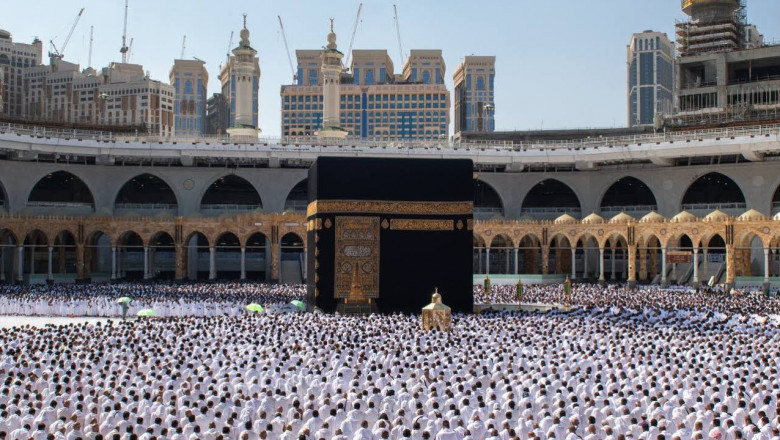views
It is not just a charitable act but an obligation upon every eligible Muslim to share their wealth with those in need.
Zakat promotes economic equality, reduces poverty, and fosters a spirit of compassion within the Muslim community. It serves as a bridge between the wealthy and the underprivileged, ensuring that wealth circulates fairly in society. If you are looking for a way to fulfill your religious duties, consider checking out the cheapest Umrah packages to combine spiritual fulfillment with an act of worship.
The Meaning and Importance of Zakat
The word Zakat originates from the Arabic root “Z-K-W,” which means purification, growth, and blessing. In Islamic teachings, it signifies the purification of wealth and the soul. By giving Zakat, Muslims cleanse their earnings and ensure that their wealth is not hoarded but used for the benefit of society.
Quranic Commandments on Zakat
The obligation of Zakat is mentioned multiple times in the Quran, often coupled with Salah (prayer). Allah commands:
"And establish prayer and give Zakat, and whatever good you put forward for yourselves – you will find it with Allah. Indeed, Allah is Seeing of what you do." (Quran 2:110)
This verse, among many others, emphasizes the importance of Zakat alongside prayer, highlighting its crucial role in a Muslim’s faith.
Zakat as a Social Welfare System
Zakat is more than just a personal obligation; it is a system that uplifts the entire Muslim community. It plays a vital role in:
Eradicating Poverty: Zakat provides financial assistance to those in need, helping them build a stable life.
Bridging the Wealth Gap: It prevents wealth from being concentrated among the elite and distributes it fairly.
Encouraging Generosity: By giving Zakat, Muslims develop empathy and a sense of responsibility towards others.
Supporting Islamic Institutions: Many religious institutions, orphanages, and charities sustain themselves through Zakat contributions.
Who is Eligible for Zakat?
According to Islamic jurisprudence, Zakat should be distributed among eight categories of people, as mentioned in Surah At-Tawbah (9:60):
-
The Poor (Al-Fuqara') – Those who do not have enough to meet their basic needs.
-
The Needy (Al-Masakin) – Those who have limited resources but struggle for sustenance.
-
Zakat Collectors (Al-‘Amilun ‘Alayha) – Those appointed to manage and distribute Zakat funds.
-
New Muslims (Mu'allafatu Qulubuhum) – Converts or individuals whose hearts need to be strengthened in Islam.
-
Captives and Slaves (Fi Ar-Riqab) – To help in the liberation of slaves.
-
The Indebted (Al-Gharimin) – Those burdened by debts and unable to repay them.
-
In the Cause of Allah (Fi Sabilillah) – Supporting religious and charitable causes.
-
The Wayfarer (Ibn As-Sabil) – Stranded travelers in need of financial assistance.
How to Calculate Zakat?
Zakat is 2.5% of an individual’s accumulated wealth, provided it meets the Nisab threshold. The Nisab is the minimum amount of wealth a Muslim must own before Zakat becomes obligatory. It is calculated based on gold (approximately 87.48 grams) or silver (approximately 612.36 grams). If one's wealth exceeds this amount for a lunar year, they must give Zakat.
The Benefits of Giving Zakat
Spiritual Benefits
Purification of Wealth: Zakat ensures that earnings remain pure and are used ethically.
Strengthening Faith: It reinforces the bond between the giver and Allah.
Protection from Greed: Regularly giving Zakat cultivates humility and contentment.
Economic and Social Benefits
Reduces Economic Inequality: It balances wealth distribution within society.
Enhances Community Welfare: Many charitable institutions rely on Zakat funds to operate.
Encourages Sustainable Development: Zakat supports businesses and employment opportunities for those in need.
The Connection Between Zakat and Umrah
Zakat and Umrah are both acts of devotion that purify a Muslim’s soul. Many Muslims prefer performing Umrah during Ramadan, as the rewards are multiplied in this sacred month. If you wish to combine your charitable efforts with a spiritual journey, check out the Ramadan Umrah Packages to plan your pilgrimage effectively.
Modern Ways to Give Zakat
With advancements in technology, fulfilling Zakat obligations has become more accessible. Many Islamic charities and organizations provide online platforms where Muslims can calculate and donate their Zakat securely. Some modern methods include:
Online Transfers: Many banks and apps offer direct Zakat payment options.
Zakat-Eligible Crowdfunding: Donating to verified campaigns supporting those in need.
Local Mosques and Charities: Many mosques collect and distribute Zakat to deserving individuals.
Conclusion
Zakat is more than just a charitable donation; it is an essential pillar of Islam that fosters financial justice and compassion. It ensures that wealth is circulated fairly, uplifting the underprivileged and strengthening community ties.
Every Muslim who meets the Nisab criteria must give Zakat with sincerity, knowing that their contributions bring blessings both in this world and the hereafter. Moreover, combining acts of worship like Umrah with charity during Ramadan amplifies the rewards manifold.
May Allah accept our efforts in giving Zakat and guide us in fulfilling our religious duties with sincerity and devotion.

















![Sustainable Tourism Market [2025-2033] is Growing Rapidly at Upcoming](https://timessquarereporter.com/upload/media/posts/2025-04/17/sustainable-tourism-market-2025-2033-is-growing-rapidly-at-upcoming_1744885338-s.jpg)




Comments
0 comment